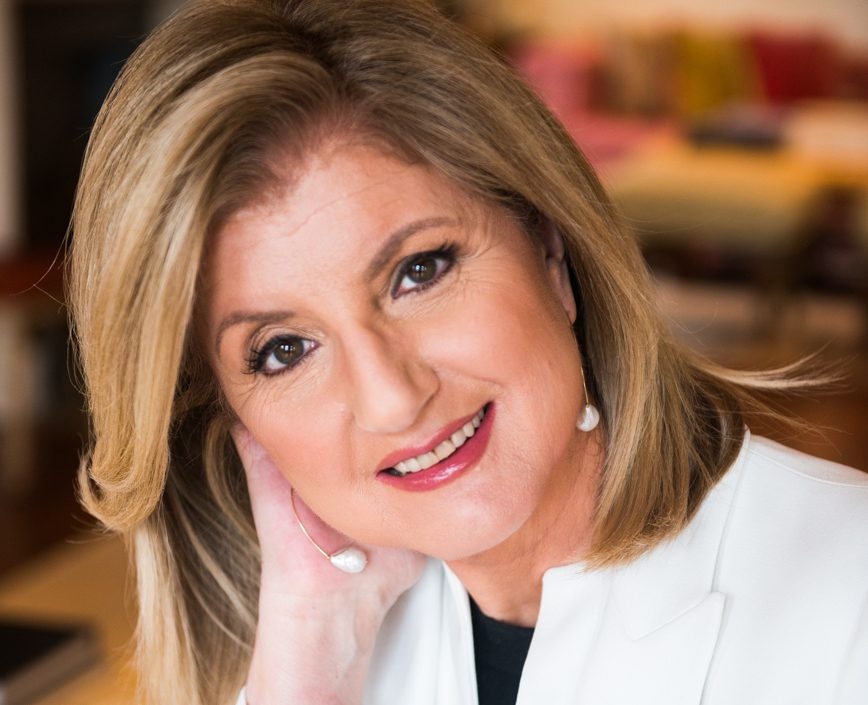By Monica Corcoran Harel
Triple-threat Arianna Huffington is an intrepid entrepreneur, bestselling author of 15 books and mother to two daughters. But the multi-millionaire who founded the wellness platform Thrive Global prioritizes her health and happiness above all—and wants you to follow her lead. In this candid convo, she shares her secrets for achieving success and serenity.

People brag, “I’m crazy busy” like it’s a good thing. When did being overwhelmed become admirable?
It’s been happening for a few decades, but it’s certainly accelerated in the digital age, when people used the idea of being overwhelmed—“I’m slammed!” “I’m drowning!” “I’m underwater!”—as a way of saying they take their job seriously. But the problem is that it’s really telegraphing the opposite. In most cases, what saying you’re overwhelmed really means is that you’re actually not taking your job seriously enough to relentlessly prioritize so that you’re not overwhelmed. But the fact that saying you’re busy is still seen as a badge of honor shows how much we need to shift the culture.
Are we moving away from that sensibility?
We are, but not fast enough—and time is of the essence because there are millions of lives at stake.
In your book Thrive, you note that cheetahs can go from zero to 60 mph in three seconds but also sleep up to 18 hours a day. What else can we learn from smart, efficient animals?
That they only expend that kind of energy when they need to. And the reason they’re able to do that is because they recharge when they don’t need to be expending maximum energy. But too many people exist in that state of fight-or-flight all the time, which isn’t a productive—or fulfilling—way to live.
As a “sleep evangelist,” how do you encourage skeptics to snooze more?
Most people want to: sleep awareness has transformed dramatically ever since I wrote The Sleep Revolution. Now it’s more about moving from knowing what to do to doing it. But for real skeptics, I’d say try it—and once you do, the benefits are so clear it becomes easier to make it a priority.
Name one personal wellness rule or habit that you will never bend on.
To not charge your phone by your bed. Our phones are repositories of everything we need to put away to allow us to sleep: our to-do lists, our in-boxes, the demands of the world. So charging your phone away from your bed makes you more likely to wake up as fully charged as your phone.
Technology. When and how do you disconnect on a daily basis?
I try to create space at the beginning and end of the day. In addition to not sleeping with my phone, in the morning instead of reaching for it first thing, I take a few minutes to meditate or just set my intention for the day. Resisting your phone and creating these spaces at the beginning and end of your day also reinforces your sense of being in control of your relationship with technology.
But you have over three million followers on Twitter. Doesn’t social media ever exhaust you?
It doesn’t, because I don’t allow myself to get lost in it. I use it to speak out on issues I care about, let people know about Thrive Global content that I’m proud of, and connect with our audience. Social media can be very valuable—but like all technology, it’s just a tool, and how much it adds to your life depends on how you use it.
Thrive Global is a platform for consumers and corporations. What’s the most common anti-wellness behavior you see in the American workplace?
This macho idea that burnout is a proxy for commitment and dedication.
On a more upbeat note, what have you seen lately that confirms the workplace is changing for the better?
The awareness of the direct connection between productivity and well-being is skyrocketing. But changing the culture is another thing. More and more workplaces are instituting healthier well-being policies, but we still need more role models at the top.
You have said that burnout is more prevalent among women. Why is that?
Women pay the highest price for our culture of stress and burnout, in which long hours and sleep deprivation are taken as proxies for seriousness and dedication. And this becomes a backdoor way of excluding women or at least making it harder for them to advance. And the cost to women isn’t just professional: women in highly stressful jobs have a nearly 40 percent increased risk of heart disease and heart attacks, and a 60 percent greater risk for type 2 diabetes (a link that does not exist for men, by the way).
That’s jarring. What type of hours did you keep as the cofounder and editor-in-chief of The Huffington Post?
Hours that were too long. Then in 2007, I collapsed from exhaustion and broke my cheekbone. That led to a lot of changes in my life. I learned about the connection between well-being and productivity, which led me to write Thrive. Now I realize it’s not about working longer, but smarter.
How do you define personal success?
Living a life filled with well-being, wisdom, wonder and the power of giving.
I know that you start and end each day by listing three things that you are grateful for. What was today’s haul?
The beautiful weather, a great lunch and reconnecting with an old friend.
Article by Mosaic and provided courtesy of Morgan Stanley.
The authors are neither employees of nor affiliated with Morgan Stanley Smith Barney LLC ("Morgan Stanley"). By providing this third party article, we are not implying an affiliation, sponsorship, endorsement, approval, investigation, verification or monitoring by Morgan Stanley of any information contained in the article.
This article has been prepared for informational and educational purposes only. The opinions expressed by the authors are solely their own and do not necessarily reflect those of Morgan Stanley. The information and data in the article has been obtained from sources outside of Morgan Stanley and Morgan Stanley makes no representations or guarantees as to the accuracy or completeness of information or data from sources outside of Morgan Stanley.
Morgan Stanley Smith Barney LLC. Member SIPC. CRC 2133105 06/2018

